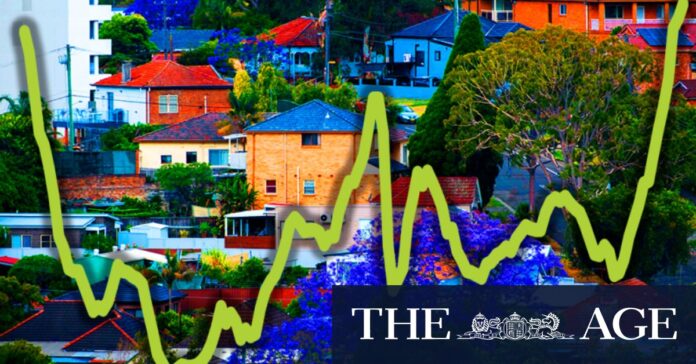[ad_1]
Melburnian house buyers would face paying out 50.5 per cent of incomes, based on a median value of $937,000.
Brisbane, by contrast, is not quite at its record and just below its GFC-era peak at 47.5 per cent of incomes for a house valued at $860,465, while Perth is well below 1990 levels at a more modest 32.3 per cent.
On Tuesday, the Reserve Bank raised the cash rate by another 0.25 per cent, to 4.35 per cent.
Impact Economics and Policy economist Dr Angela Jackson said the worst mortgage affordability since the 1990s hit young families hardest.
“It means we’re seeing, and will continue to see, increasing rates of household stress,” Jackson said. “That’s a particular concern for economists because it impacts their health, productivity and childhood development.”
Loading
Jackson said the level of stress was much higher on current generations, than Baby Boomers who were facing higher interest rates in the 1990s.
“Even though interest rates are nominally lower than the 1990s, the impact on families is even greater,” she said. “The Boomer generation remembers very well what it was like facing interest rates and mortgage repayments back in the early 1990s. We should all be very concerned the current generation is facing even higher levels of stress.”
Sydney-based Open Home Loans principal broker Samuel Philipos said households who had been stretched were already tightening their belts by cutting down on discretionary spending and other essential costs.
While banks were in a position to provide more competitive rates, he said, they were reluctant to offer it quickly enough to have an impact.
Philipos urged banks and governments to do more to support vulnerable households, including first home buyers and young families.
“The most vulnerable are the first home buyers who purchased in the past three years,” Philipos said. “There isn’t enough being done from a bank’s perspective to support borrowers to help go through this phase.”
He said the same pandemic-era supports are needed again for those struggling to survive in the current market.
Melbourne-based mortgage broker Chris Foster-Ramsay, of Foster Ramsay Finance, said those who had upgraded their homes, and did not have money to fall back on, were finding interest rate rises tough and were also cutting back on discretionary spending.
He said the number of buyers wanting to get into the market were falling, though there were still those wanting to get in and buy while there was less competition, and were hoping interest rates would soon fall.
“For first home buyers and single applicants, I understand things are challenging for these groups, and they continue to be at the mercy of cashed-up investors or those who have been heavily assisted by the bank of mum and dad,” Foster Ramsay said. “For some, it’s a long and demoralising search until they find what they want.”
[ad_2]
Source link



